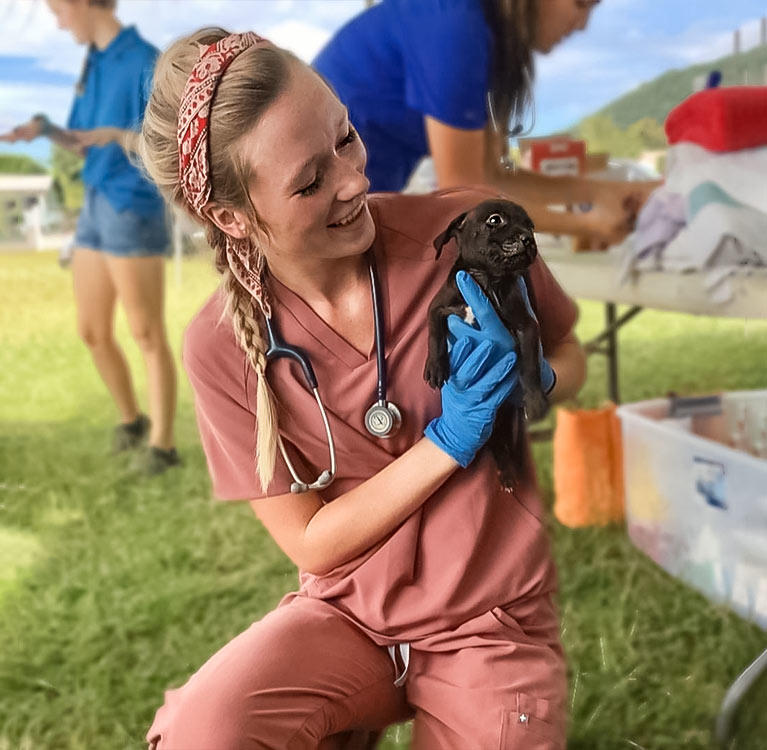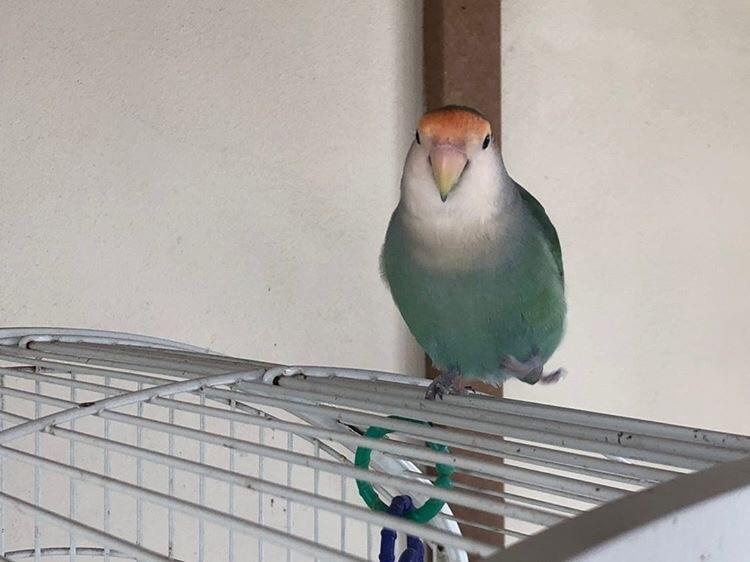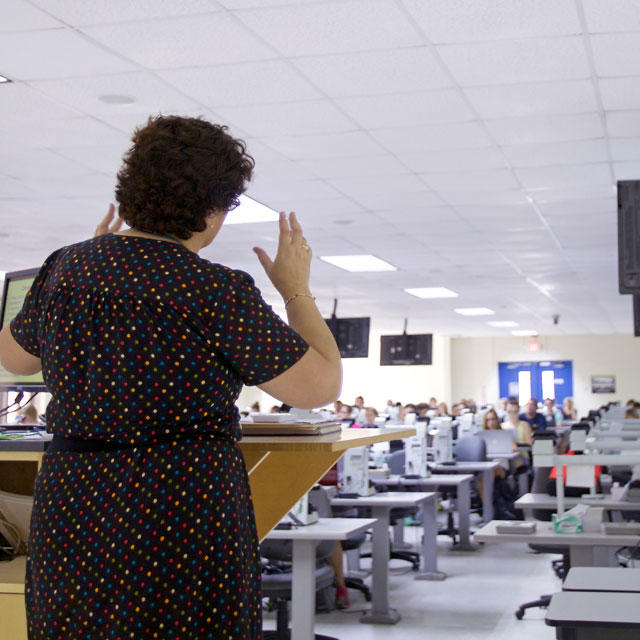Doctors of aquatic veterinary medicine provide complete health care for animals that live in water—everything from whales and sharks to alligators, mollusks, and penguins. An aquatic veterinarian may draw blood samples from clownfish, perform surgery on an anaconda, or protect the health of an entire salmon fishery. If you are interested in becoming a specialist in aquatic medicine you should be aware that it can be a long and difficult—but rewarding—path. Your path includes eight years of undergraduate study and veterinary school, and some aquatic veterinarians further their studies with internships or specialist residencies.
Vet school can be rigorous and requires you to have dedication and patience. It also requires a desire to learn and the compassion to help animals live better and healthier lives. Aside from their academic talents, aquatic veterinarians also typically have a background with water animals or a special affinity for the water. The steps to becoming an aquatic medicine veterinarian are detailed below. Consider everything well—it is a big decision to start down the aquatic animal medicine path. If you think you want to be an aquatic specialist, ask yourself some questions:
- Do you own fish or simply admire the beauty of aquatic animals?
- Are you interested in wildlife conservation?
- Are you ready to get wet every day at work?
- Do you enjoy the biological sciences?
- Are you fascinated by aquatic animal anatomy?
- Do you want a challenging and rewarding career?
- Do you want to combine veterinary medicine with environmental health?
- Are you dedicated to improving the lives of animals?
- Are you an excellent student who wants to continue learning?
If you answered “yes” to one or more of these questions, then a career as an aquatic medicine veterinarian may be for you.
What Does An Aquatic Veterinarian Do?
General practitioners of aquatic medicine care for a wide variety of animal life, anything that crawls, slithers, or swims—and lives—in the water. More than 70 percent of the Earth’s surface is covered with water, but only about 20 percent of the world’s animal population lives in it. That 20 percent, however, is incredibly varied, allowing for several paths of aquatic medicine specialization. Some doctors are experts in marine mammals such as dolphins, dugongs, manatees, otters, polar bears, porpoises, sea lions, seals, walruses, and whales.
Fish veterinarians care for baitfish, food fish, pet or ornamental fish, and wild or gamefish. Some aquatic veterinarians specialize in amphibians and reptiles, and others are experts in diagnosing and treating conditions in such invertebrates as corals, crustaceans, and mollusks. Still others work with penguins and seabirds, or are experts in aquaculture and fisheries.
Aquatic and marine veterinarians work in a wide variety of locations, but every place has one thing in common- water. As a doctor of aquatic animal medicine, you will spend a lot of time at the water’s edge, and getting wet is part of the job. You may also make house calls, travel to see animals in need in large and small aquariums, harbors, marine sanctuaries, private ponds, and zoos—or you may be a permanent doctor in residence at such places. Other opportunities include working in a laboratory or cast widely around the world’s lakes, oceans, and rivers.
Aquatic veterinarians are experts in aquatic animal anatomy, anesthesia, clinical pharmacology, diagnostic imaging, emergency medicine, laboratory diagnostics, medical examinations, necropsies (animal autopsies), nutrition, and surgery. They administer tests and vaccinations, evaluate behavior, and treat wounds. Marine veterinarians are also engaged in scientific research and wildlife conservation, and they are keenly aware of the harmful effects of chemicals, plastics, metals, and many microorganisms on aquatic animals.
Aquatic medicine practitioners are responsible for the medical management and welfare of water animals. They must be prepared for a wide variety of conditions, diseases, and injuries, as well as for the use of medications and various methods of treatment. The range of ailments in aquatic animals is as diverse as the animals themselves. For example, fish may suffer from such problems as:
- Amoebiasis
- Bacterial gill disease (BGD)
- Bacterial kidney disease (BKD)
- Bloat
- Blue-sac disease (BSD)
- Bone deformities
- Cardiomyopathy syndrome (CMS)
- Cataracts
- Clamped fin
- Epitheliocystis
- Flavobacterium psychrophilum
- Gas bubble disease
- Heart and skeletal muscle inflammation (HSMI)
- Hemorrhagic septicemia
- Lesions and wounds
- Metal toxicity
- Mycobacteriosis
- Nephrocalcinosis (urolithiasis)
- Parasite infestations
- Piscine Orthoreovirus (PRV)
- Ragged tail fin
- Skin edema (dropsy)
- Strawberry disease
- Swim bladder and buoyancy disorders
- Syncytial hepatitis
- Tenacibaculosis
- Tumors
- Vertebral compression
- Wasting disease
Amphibians, invertebrates, marine mammals, reptiles, and seabirds also suffer from problems unique to their class, thus creating a super spectrum of possibilities when it comes to diagnosing and treating conditions in aquatic animals. To treat the many conditions, aquatic vets may use a wide range of medications and therapies and such procedures as endoscopy, radiography, surgery, and the taking of ultrasounds and X-rays. Necropsies, or animal autopsies, are also an important—if tardy—tool in diagnosing problems in aquatic animals.
Not all aquatic veterinarians grow up around water animals or near great lakes, rivers, or seas, but most have significant aquatic animal experience before entering veterinary school. You can gain experience by volunteering at aquariums or aquatic animal facilities, exotic animal veterinary hospitals, research labs, wildlife rehabilitation facilities, and zoological facilities.
How To Become An Aquatic Veterinarian?
An aquatic animal medicine specialist studies to become a Doctor of Veterinary Medicine (DVM) by attending a veterinary school accredited by the American Veterinary Medical Association (AVMA)—such as the Ross University School of Veterinary Medicine (RUSVM)*. RUSVM runs an accelerated DVM program of 3.25 years, but most veterinary schools are four years. At Ross Vet, your first seven semesters are spent on campus in St. Kitts completing 130 semester credit hours of specifically prescribed coursework. Your remaining three semesters are clinical curriculum, where you will get to experience treating patients, learning procedures, and familiarize yourself with the responsibilities vets have.
Ross Vet students who are on the path to becoming aquatic veterinarians, have the opportunity to gain experience during their clinical year. After graduation, aquatic DVM’s may enter general practice or advance to one-year aquatic medicine internships ahead of applying to three-year residencies to earn specialized degrees in Aquatic Veterinary Medicine, Wildlife Conservation Medicine, Zoological Companion Animal Medicine and Surgery, or Zoological Medicine.
DVM’s specializing in aquatic medicine are certified in aquatic animal practice by the American Board of Veterinary Practitioners, the American College of Zoological Medicine (ACZM), or by the board of their eventual specialty. They may apply for membership in the AVMA, the American Association of Fish Veterinarians (AAFV), the American Fisheries Society, the Association of Reptile and Amphibian Veterinarians (ARAV), the International Association for Aquatic Animal Medicine (IAAAM), the Society for Marine Mammalogy (SMM), the World Aquatic Veterinary Medical Association (WAVMA), and other professional societies.
A Career in Aquatic Medicine
Aquatic medicine specialists may work in private practice or in government agencies, research facilities, specialized animal clinics, universities, wildlife refuges, or zoos. Many aquatic veterinarians also provide ambulatory service—meaning they go to the animals rather than the animals coming to them. Ambulatory service allows for a good degree of independence, but also many hours of travelling to and from such places as aquariums, private homes, waterways, and zoos. Aquatic veterinarians often work long hours, including weekends, and they may be on-call for emergencies. Aside from examining, diagnosing, and treating their aquatic animal patients, they consult with animal agencies, owners, and organizations; aquatic care team members; and other veterinary specialists. They also dedicate time to research, studying, and teaching—some board-certified aquatic medicine specialists opt for academic positions instead of going into practice.
Demand for Aquatic Medicine Specialists
Demand for all veterinary specialists is high. Aquatic medicine is a somewhat limited field, but also a specialized field, especially in recent years as fish owners have become more aware of the specialty and as aquariums and zoos have hired more highly trained and skilled veterinary teams to care for their animals.
The Ross University School of Veterinary Medicine provides an accelerated, broad-based curriculum that integrates unique research opportunities, classroom study, and hands-on clinical training. Take the next step on your path to becoming an aquatic veterinarian: apply for admission to RUSVM.
Related resources:
*Ross University School of Veterinary Medicine confers a Doctor of Veterinary Medicine (DVM) degree, which is accredited by the American Veterinary Medical Association Council on Education (AVMA COE), 1931 N. Meacham Road, Suite 100, Schaumburg, IL 60173, Tel: 800.248.2862. For more information please visit: https://www.avma.org/education/accreditation-veterinary-colleges.
The AVMA COE uses defined standards to evaluate veterinary medical education programs, including facilities, clinical resources, curriculum, faculty, student outcomes and research programs. The standards are interpreted and applied by the AVMA COE-accredited veterinary medical education programs in relation to its mission.








